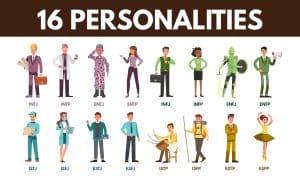10 Best Personality Assessment Tools to Unlock Your True Potential
Por: Daynara A. em 14 de junho de 2025

The Power of Self-Discovery
Why Understanding Yourself Matters
Self-awareness is the foundation of personal development. When you know your patterns, motivations, and challenges, you make wiser choices. Whether you’re pursuing a career path, improving relationships, or working on your goals, self-discovery helps you show up more fully and confidently in life.
How Personality Tests Support Growth
The best personality assessment tools do more than categorize—you gain practical insight into your strengths, blind spots, and ideal environments. They highlight areas for improvement while validating your innate tendencies. This blend of guidance and affirmation is crucial for deep, lasting personal growth.
What Makes a Great Personality Assessment?
Scientific Reliability and Accuracy
A quality personality test should be both reliable (producing consistent results) and valid (measuring what it claims to). Look for tools grounded in psychological research with a clear scoring system and meaningful interpretations.
Beyond Fun Quizzes: Entertainment vs. Psychology
While online quizzes can be entertaining, many lack scientific credibility. Research-based assessments provide structured feedback you can trust. Choose tools that are used by professionals in coaching, counseling, or organizational development.
Mindset Matters: Use Results as a Mirror, Not a Mold
Treat assessments as starting points for exploration—not permanent labels. Your personality is dynamic, and these tools are most useful when approached with curiosity rather than limitation.
1. Myers-Briggs Type Indicator (MBTI)
Overview
MBTI is one of the most widely recognized personality assessments. It categorizes individuals into 16 personality types based on four dichotomies:
-
Extraversion (E) vs. Introversion (I)
-
Sensing (S) vs. Intuition (N)
-
Thinking (T) vs. Feeling (F)
Why It’s Effective
MBTI can help you understand your decision-making style, communication preferences, and energy sources. It’s widely used in team building and career counseling.
Limitations
While popular, MBTI is not without criticism—its results can shift over time and oversimplify complex personalities. Use it as a tool for awareness, not as a rigid definition.
2. Big Five Personality Test (OCEAN Model)

Overview
This evidence-based test measures five dimensions:
-
Openness (creativity and imagination)
-
Conscientiousness (organization and reliability)
-
Extraversion (sociability and energy)
-
Agreeableness (compassion and cooperation)
-
Neuroticism (emotional sensitivity)
Why It’s Effective
The Big Five is considered the most scientifically robust personality model. It offers nuanced insights into behavior and is useful for career planning, personal development, and therapy.
Limitations
It lacks the narrative richness of types like MBTI or Enneagram but compensates with accuracy and applicability.
3. StrengthsFinder (CliftonStrengths)
Overview
CliftonStrengths identifies your top five strengths out of 34 talent themes. These are grouped into four domains:
-
Executing
-
Influencing
-
Relationship Building
-
Strategic Thinking
Why It’s Effective
This tool encourages a strengths-based approach to development. Rather than “fixing” weaknesses, you focus on what energizes you—ideal for workplace performance and leadership growth.
Limitations
It’s more effective when supported by coaching or team applications, and less focused on general personality traits.
4. Enneagram Personality Types
Overview
The Enneagram describes nine core types, each defined by a central fear and motivation. You can also explore “wings,” subtypes, and growth paths.
Why It’s Effective
The Enneagram goes beyond traits to explore emotional motivations, internal conflict, and transformation. It’s deeply reflective and offers paths for growth.
Limitations
Interpretation can be subjective. For deeper understanding, pairing the assessment with books or coaching is recommended.
5. DISC Assessment
Overview
DISC categorizes behavior into four styles:
| Style | Description |
|---|---|
| Dominance | Task-oriented, assertive |
| Influence | People-oriented, enthusiastic |
| Steadiness | Dependable, cooperative |
| Conscientiousness | Detail-focused, analytical |
Why It’s Effective
DISC is widely used in workplace settings. It enhances communication and collaboration by helping people understand their interaction styles.
Limitations
It focuses more on behavior than internal traits or motivations. Still, it’s useful for practical team building and leadership training.
6. Emotional Intelligence Assessments (EQ)

Overview
EQ tests measure emotional awareness, empathy, regulation, and social skills. Popular tools include:
Why It’s Effective
High emotional intelligence correlates with better relationships, leadership, and stress management. It helps you understand both your own emotions and others’.
Limitations
Some assessments can be costly and require certified administration. Choose versions with clear feedback and improvement steps.
7. Values Assessment Tools
Overview
These tools help you identify your core values—such as integrity, family, or creativity—and how they shape your life.
Why It’s Effective
Understanding your values helps align decisions, goals, and relationships with what truly matters to you. This clarity boosts fulfillment and resilience.
Popular Tools
-
Barrett Values Centre assessments
-
Card-sorting exercises
-
VIA Character Strengths (which blends values and traits)
8. Career Assessments (Holland Code/RIASEC)
Overview
Career assessments match your interests and traits with job types. The Holland Code categorizes preferences into six types:
-
Realistic
-
Investigative
-
Artistic
-
Social
-
Enterprising
-
Conventional
Why It’s Effective
These assessments help you find career paths aligned with your strengths, values, and preferences—reducing burnout and improving satisfaction.
Limitations
They may focus heavily on industry match over passion. Combine with personality or strengths tools for holistic planning.
9. Ikigai Mapping (Purpose Discovery)
Overview
Ikigai is a Japanese concept that blends:
-
What you love
-
What you’re good at
-
What the world needs
-
What you can be paid for
Why It’s Effective
When paired with assessments like StrengthsFinder, values tools, or career inventories, Ikigai offers a holistic blueprint for meaningful life design.
Practical Steps
Use a Venn diagram or journaling to connect themes across your assessments. Revisit your Ikigai as you evolve.
10. 16Personalities (Free MBTI-Inspired Test)

Overview
16Personalities is a popular online adaptation of MBTI, blending traits and behavior explanations in a user-friendly format.
Why It’s Effective
It provides instantly accessible insights for personal reflection or relationship improvement—great for beginners on their self-discovery journey.
Limitations
It simplifies the MBTI model and lacks research backing. Best used as an introduction, not a definitive source.
Using These Tools to Unlock Your True Potential
Build a Personal Insight Map
Combine your top assessment results into one document. Identify common themes across strengths, values, interests, and emotional skills.
Align Goals and Choices
Use this insight to:
-
Choose aligned career paths
-
Improve communication styles
-
Develop emotional resilience
-
Set values-based goals
Treat Assessment as a Journey
Personality evolves. Revisit assessments every few years to reflect changes in life stages, values, and experience.
Your Personalized Self-Discovery Toolkit
There’s no single test that defines you. But when combined thoughtfully, these 10 personality assessment tools offer a powerful roadmap for becoming the best version of yourself. By understanding your patterns, strengths, values, and purpose, you can make clearer decisions, nurture authentic relationships, and create a life that reflects your true potential.





